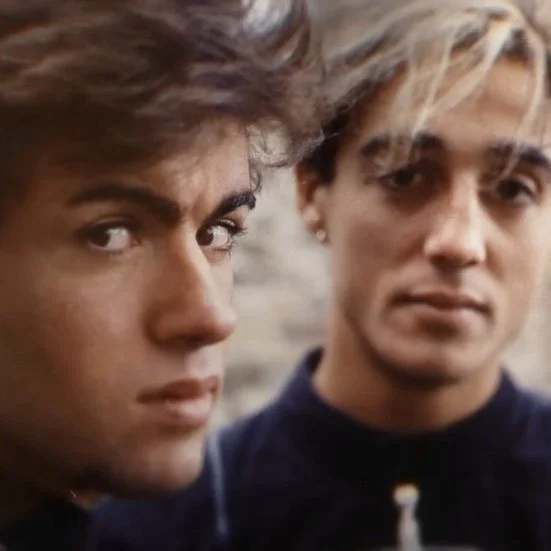Gotta Have Fate
The Netflix documentary, Wham! is as much about destiny, as it is about one of the biggest pop acts of the 1980s and its global impact over a mere five years. The story of how Georgios “George Michael” Panayiotou and Andrew Ridgeley became the legendary pop group is told mostly through archival footage and audio soundbites.
Meeting at school as pre-teens, Andrew and Yog, Andrew’s nickname for Georgios, became friends with a mutual interest in music. By their late-teens, the pair began writing catchy tunes laced with social commentary, plus ones that embraced the frivolity of youth culture (“Club Tropicana”), as well as others that appeared on their 1983 debut album, Fantastic. “Wham Rap! (Enjoy What You Do),” “Bad Boys” and “Young Guns (Go For It),” positioned Yog, professionally known as George Michael, as the rebellious protagonist, hell- (or heck-) bent on avoiding the 9 to 5 and “death by matrimony,” and set on saving Andrew Ridgeley’s character from a “straight-laced” life (one without George). Besides the (not-so) underlying homoerotic subtext, gay subculture iconography played heavily: leather jackets; tight jeans; aviator glasses—a look that solo George would don again for the Faith era. The musical and visual appeal of Wham! was far-reaching.
Co-crafting the sax-drenched power ballad, “Careless Whisper,” continuing into the Make It Big album (“Wake Me Up Before You Go-Go”; “Everything She Wants”; “Freedom”) and their final, Music from the Edge of Heaven (“Last Christmas”; “I’m Your Man”; “Where Did Your Heart Go?”), both traveled down the same creative pop-music path, only for them to hit the proverbial fork in the road, with personal goals and professional roles shifting as they achieved international success. Watching the documentary through the lens of loss, and letting go in life, adds further emotional resonance to what is essentially a story of unconditional love between friends, with one who must selflessly accept what is, so the other can become who he was destined to be.
Go-go watch it if you haven’t.
Better with Age: Kylie Minogue Reimagines “Hand On Your Heart”
In 2012, to commemorate her 25th anniversary in the music business, Kylie Minogue released The Abbey Road Sessions, a 16-track album of remixes, not the expected dance remixes of her pop songs, but rather ones that were reimagined and recorded with her Aphrodite touring band and a full orchestra at London’s legendary Abbey Road Studios. Let’s focus on one track in particular, “Hand On Your Heart,” originally appeared on her 1989 album, Enjoy Yourself. Written by Stock, Aitken & Waterman (S.A.W.), the Ford, Carnegie & Rockefeller of “hit factory” Brit-pop music of the ‘80s, the song initially sounded sunny and matter of fact, a carefree account of its main character asking her guy to “Put your hand on your heart and tell me/that we’re through.”
The Abbey Road Sessions’ version dons a mature feel. It embraces a soothing arrangement, complete with a delicate sweeping brush beat and mesmerizing acoustic-guitar sequence. It sounds as if the main character is retelling the same account, but from a different point of view and place in her life. The once nonchalant teenager is now a more serious, vulnerable woman, confident that even if this guy is not around, she’ll survive. Kylie’s delivery as a balladeer is sweet and sensitive with a somber lower register, especially at the resounding lyric: “that we’re through.”
By offering a quieter version of the originally upbeat, head-in-the-clouds track, it allows the S.A.W. lyrics to be honored, proving that although seemingly factory-like, pumping out shiny product off the line, their operation did in fact produce enduring gems. The Sessions also applies a similar treatment toward two other S.A.W. songs: the unrequited infatuation with a fantasy lover on “I Should Be So Lucky”; the devoted desperation on “Never Too Late.” The release is yet another example that disproves the many who thought Kylie was an Edsel of the ‘80s, confirming instead that after all these decades she’s always been a Bentley of pop.

